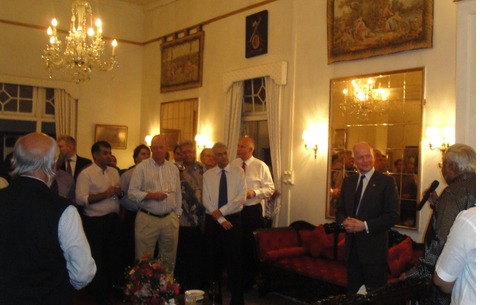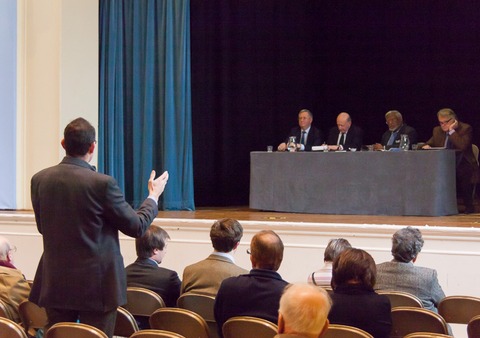| | | |  |
Dear friend,
This
month saw politicians, business people and civil leaders from across
the globe gather in Colombo, for the 2013 Commonwealth Heads of
Government Meeting (CHOGM). This voluntary organisation represents
fifty-four nations and over two billion people. Whilst separated by
oceans, faiths and ethnicities, the peoples of this global fellowship
are united by a universal language, a commitment to democracy and good
governance as well as possessing similar legal structures and
understanding.
This burgeoning global market represents
unparalleled potential for our businesses and yet since Britain’s
accession into the EEC our political class have treated the Commonwealth
with utter contempt and gross negligence. It became very fashionable
to dismiss the organisation as little more than the relic of the
imperial era, destined to wilt into complete irrelevance, in contrast to
the assured rise of a federal European economy.
History proves
they were wrong. The combined economy of the Commonwealth has already
overtaken the Eurozone, with a projected annual growth of 3.7%. In
addition, its labour force has been forecast to increase by 60%, or 825
million by 2050. While Britain’s trade has been redirected and limited
to ever declining European markets, nations within the Commonwealth such
as India are witnessing the growth of an emerging middle class, who
would be very receptive towards Britain’s high-end goods and services.
During
the time I spent at CHOGM and over the coming months, I am striving to
find new ways in which we can help our businesses here in the South East
expand into these emerging markets – and how in turn we can entice
inward investment into our region. There are seven Commonwealth nations
in the top 25 ease of doing business rankings, a far cry from the red
tape we have to swallow from Brussels. At a time when our relationship
with the Eurozone is actively hindering and not helping, our economy, it
is of paramount importance that we re-engage with Commonwealth nations
on a bilateral basis and raise our prospects beyond the narrow confines
of Europe, as your ancestors once did.
With best wishes,
Nirj |
| Let Britain decide – campaign for a 2017 in/out referendum
|
|  |
Nine months ago at a public meeting in Winchester, my fellow MEP candidate Richard Robinson and I pressed the need for a piece of UK legislation in this parliament to mandate a definitive referendum in the next. Since then I am most encouraged to see the idea take hold throughout the party, culminating in the government-backed private members bill of James Wharton MP to do just that; write into law that by 2017 the British people must be given the final say on our membership of the EU.
Not only has this bill gone some way to restore the public’s trust in our stance on the EU, but it has also exposed the cowardly positions of the Lib Dems and Labour. In the past three weeks we have seen constant attempts to block a third reading, every filibustering tactic in the book has been deployed by labour and liberal opponents, the ultimate objective to deny you your right to decide where the sovereignty of this nation should reside. No doubt the bill, which finally received Commons approval on Friday, will receive a similar reception from cowardly opponents in the House of Lords next year.
This serves as a stark reminder; the Conservative Party remains the only Westminster party committed to delivering an EU referendum, and we should remind ourselves and the electorate of this fact.
|
| | | Strasbourg
Highlights – reporting back from October and November’s plenary session
(right) With Malala Yousafzai, as she accepts the
Sakharov Prize 2013; co-nominated by the ECR |
| Gender quotas on corporate boards
Not content with burdening the business sector with ever increasing red tape, the European Commission’s latest idea is to dictate the employment and promotions policy of our largest companies. The proposals decree a legally-binding target of at least 40% of the under-represented gender (most likely women) represented in the management bodies of companies listed on the stock exchange, with a range of punitive sanctions for those who fail to achieve this quota, including large fines and exclusion from tendering for public sector contracts.
There is no doubt that women are currently under-represented in the highest echelons of business, but ‘positive’ discrimination and further constraints upon companies serves nobody’s best interests. One only has to look at the backlash against ‘tokenism’ in Norway, following the introduction of a similar quota system and the disruption caused since.
As the percentage of female graduates continues to increase, so too does female representation on company boards; this natural trend has been apparent in Britain for the past decade and should not be overlooked. It is therefore entirely unhelpful for the EU to impose upon us a one-size-fits-all policy when the evidence suggests voluntary measures applied at a national level are more effective. Whilst the proposed directive was supported by a majority of the Parliament at November plenary, I suspect there will be significant opposition at the European Council from Member States who value a more tailored, national approach to the issue.
|
| The implementation of the common European security and defence policy
The November plenary session saw the discussion of a report related to the EU’s common defence policy (CSDP). The report argues for greater harmonisation of EU defence policy, pooling of Member States' budgets to fund military operations - including expanded common costs of EU battlegroups - and permanent structured cooperation.
This represents one of the most disturbing elements of the push for federalisation, the desire for a single, coordinated EU military force, answerable not to national legislatures but instead subservient to the European Commission. It would be far better for all of Europe if the EU spent less time playing soldiers and instead more time seeking to redress the economic storm its own destructive policies have created. As our defence & security spokesman Geoffrey Van Orden pointed out, not one of the CSDP’s current missions stands up to critical scrutiny; the police training mission in Afghanistan has largely failed while the mission to Kosovo has overseen a widespread increase in corruption and organised crime.
Defence and security policy is and must always remain a solely national concern; my colleagues and I shall not compromise the integrity of our armed forces purely to appease the sycophantic ambitions of EU federalists.
|
| Flight time limitations for aircrew
On average around 26,000 flights are handled daily over Europe, or nearly 9.5 million flights per year, making EU airspace one of the most congested in the world. Unfortunately, the reality of the situation is that in many other EU Member States there are far less stringent rules regarding pilots and flight times. Consequently, new rules were necessary in order to enhance the level of flight safety across Europe.
Following four years of study and negotiations, the final package of measures supported by the Parliament represents a significant improvement on previous proposals and contains a wealth of welcome measures that should increase safety across EU airspace as a whole. These new measures have received the support and approval of the UK government, all Member State governments, the UK Civil Aviation Authority, all Member State aviation regulators as well as every major UK political party. Therefore on balance I was satisfied with the approval given to the proposals and confident that these regulations will ensure a higher level of aviation safety across EU airspace.
Suspension of the SWIFT agreement as a result of NSA surveillance
Members of the European Parliament are shocked – shocked! - that American intelligence agencies would seek to gather information on European states. Much of the hoo-hah is being fuelled by French and German MEPs, who seem wilfully ignorant of their own intelligence services’ misdemeanours. All major nations are engaged in similar exploits, indeed, one only has to point to the huge scale of industrial espionage conducted by French agencies against European ‘allies’. Yet, in a knee-jerk reaction to the allegations, members of the socialist and liberal groups sought to suspend the SWIFT agreement between the EU and the US, following unproven allegations of the NSA violating the agreement.
The Society for Worldwide Interbank Financial Telecommunication (SWIFT) allows for the exchange of banking information in order to track terrorist financial transactions. It has undoubtedly proven a very worthwhile agreement, and aided in bringing numerous terrorists to justice. Furthermore, an EU-US ad-hoc working group had been created to investigate any lingering allegations of a breach of the SWIFT agreement but rather than wait for any actual findings, socialist and liberal groups combined to pass this motion during the October Plenary.
|
| | | Constituency Corner – your questions answered |
| Proposed regulation of electronic cigarettes
I was most encouraged in October by the many thousands of letters and emails from constituents in support of the Conservative campaign against the absurd proposals to regulate e-cigarettes as medicines. My colleagues and I have been struck by the overwhelming amount of constituents pointing to the usefulness of e-cigarettes as a gradual method of reducing smoking, along with your personal testaments to their effectiveness. Since the early stages of the draft Tobacco Products Directive, we have fought tooth and nail to amend the legislation; legislation that would have made e-cigarettes more costly to manufacture in comparison to ordinary tobacco. The success of this campaign represents a victory for common sense and demonstrates what can be achieved with the help of an enthusiastic grass-roots effort. Nevertheless, with Britain’s own Medicines and Healthcare Products Regulatory Agency threatening to brand e-cigarettes as medical products, there is still work to be done to ensure the long-term viability of the e-cigarettes.
|
| Strasbourg Parliament
Whilst the UK government seeks to reduce its spending, the European Union remains a grotesque example of extravagance, inefficiency and wilful waste of your money. A considerable amount of constituent emails to me quite rightly point to the absurdity of a second parliament in Strasbourg, which we are obliged to move the whole circus to once a month in order to placate the egotism of the French. Thankfully, after years of campaigning from all sides of the Parliament, the long-awaited ditching of the Strasbourg Parliament may be close at hand. This month witnessed the European Parliament voting 483 to 141 in favour of adopting a report formally setting out its intention to pursue the required treaty changes, and rid us of this €156m extravagance. The EU Council of Ministers is now obliged to state its position on the matter; rest assured that my Conservative colleagues and I will be strongly pressing the case to put an end to this insanity once and for all.
|
| | | | I will be back in touch with you again very soon. In the meantime you can check my website www.nirjdeva.com for regular updates and if I can be of any assistance to you on anything raised here or anything else for that matter, please do not hesitate to contact me at nirj.deva@europarl.europa.eu.
|
| | | | | | |